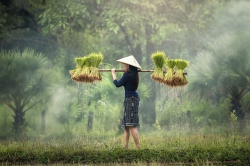Save Environment While Fighting Poverty
PROVO, Utah – Mar 15, 2018 – If you eat rice regularly, you are one of the more than 3.5 billion people worldwide who consider rice a food staple. Rice may be a commonplace pantry item, but growing rice can actually produce an inordinate amount of organic waste—550 million tons of rice straw each year. Farmers typically burn this rice straw, causing environmental and health issues for many communities, 91 percent of which are in Asia.
This year, the Social Innovation Solution Competition has partnered with Fargreen, a social venture in Vietnam that seeks to reduce open burning of rice straw by promoting environmentally friendly practices and self-reliant farming communities. Fargreen teaches small-scale farmers to collect the rice straw after harvest to produce premium, organic mushroom products that are then sold to Fargreen’s customer network.
Along with Fargreen’s environmental solutions, the organization also helps rural Vietnamese farmers earn extra income and become self-reliant through mushroom farming, empowering entire communities to overcome poverty. Interventions such as Fargreen’s that help solve more than one social issue embody what social entrepreneurship is all about.
Each year, SISC partners with vetted, socially innovative organizations for a solution competition that is much like a traditional case competition. Teams of three to five students have ten days to analyze and present a solution to a social entrepreneurship organization’s real-world challenge. Solutions are judged by a panel, and winning teams are awarded $9,000 in total cash prizes.
“This year's SISC topic is focused on the environment, which a lot of BYU students are passionate about,” says Chloe Jensen, a BYU Marriott MBA student and SISC coordinator. “Vietnam's landscapes are stunning, and we're thrilled to be able to promote an organization that is doing so much to preserve that raw beauty.”
Jensen has worked closely with Fargreen’s CEO Trang Tran, the first Vietnamese Echoing Green Climate Fellow, who is deeply passionate about social entrepreneurship. Jensen said Tran is excited to see what innovative solutions socially minded BYU students can come up with during the competition.
Students wanting to participate in SISC do not need business or nonprofit experience and have the opportunity to attend a case workshop on Wednesday, 14 March, at 5 p.m. in 3106 JKB to get answers to any questions they may have before the competition begins. The competition officially kicks off on Monday, 19 March, at 5 p.m. in 3106 JKB. Regardless of a student’s major or background, SISC offers a valuable experiential learning opportunity.
“SISC is a great opportunity to put your critical thinking abilities to the test in a meaningful way,” Jensen says. “For anyone interested in social innovation, this is one of the best opportunities on campus to interact with and learn from other like-minded students as well as renowned social entrepreneurs from around the world.”
Jill Piacitelli, another MBA student and SISC coordinator, said the skills gained from participating in the competition will benefit anyone who hopes to be an effective employee or community member who is a part of solving social problems.
If you are interested in participating in SISC, register here or email sisc@byu.edu with questions.
Key dates:
March 14–SISC Case Workshop, 5 p.m., 3106 JKB
March 19–SISC Kickoff, 5 p.m., 3106 JKB
March 28–30, SISC Judging
Media Contact: Alicia Gettys (801) 422-9009
Writer: Michaela Proctor




